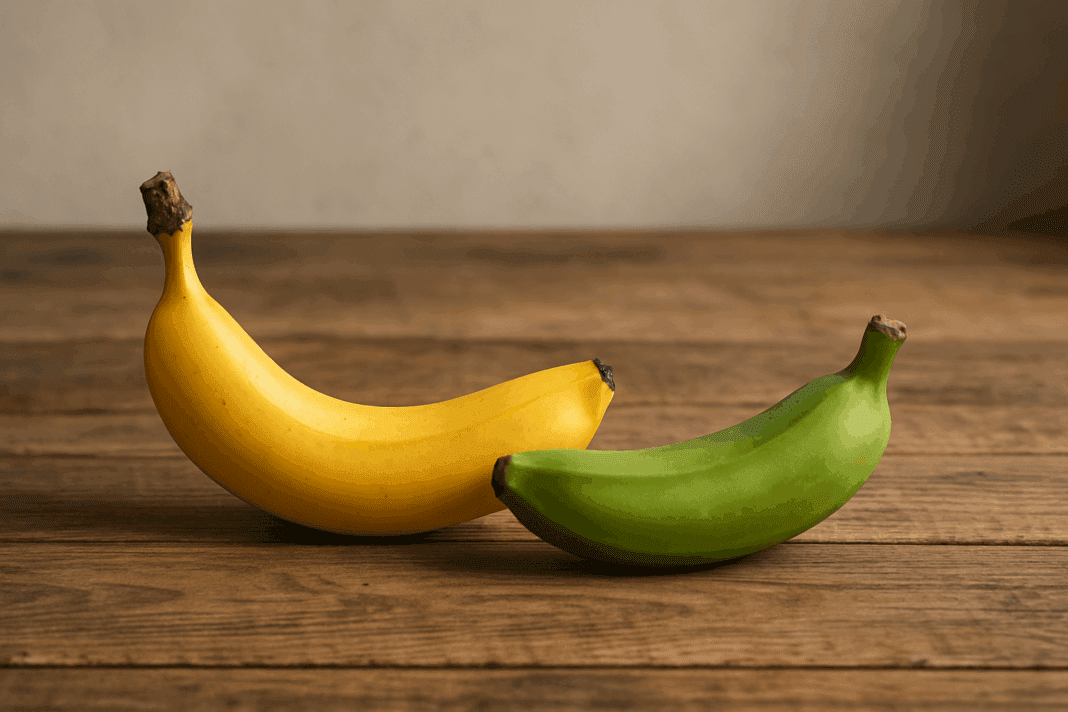Constipation remains one of the most commonly reported digestive complaints worldwide, often leading people to explore dietary solutions that can either relieve or aggravate the issue. Among the frequently debated foods is the humble banana. For many, this fruit is a daily staple, praised for its convenience and nutrient content. Yet questions like “do bananas help with constipation” often surface in wellness forums, nutrition consultations, and online searches. This widespread curiosity reflects not only the banana’s nutritional relevance but also the nuances of how different stages of ripeness may impact digestion. In this article, we explore the surprising connection between bananas and constipation, providing a thorough, evidence-based guide to help readers make informed dietary decisions.
You may also like: The Ultimate Guide to Gut Healthy Meals: Best Meals for Gut Health and Nourishing Recipes You’ll Love
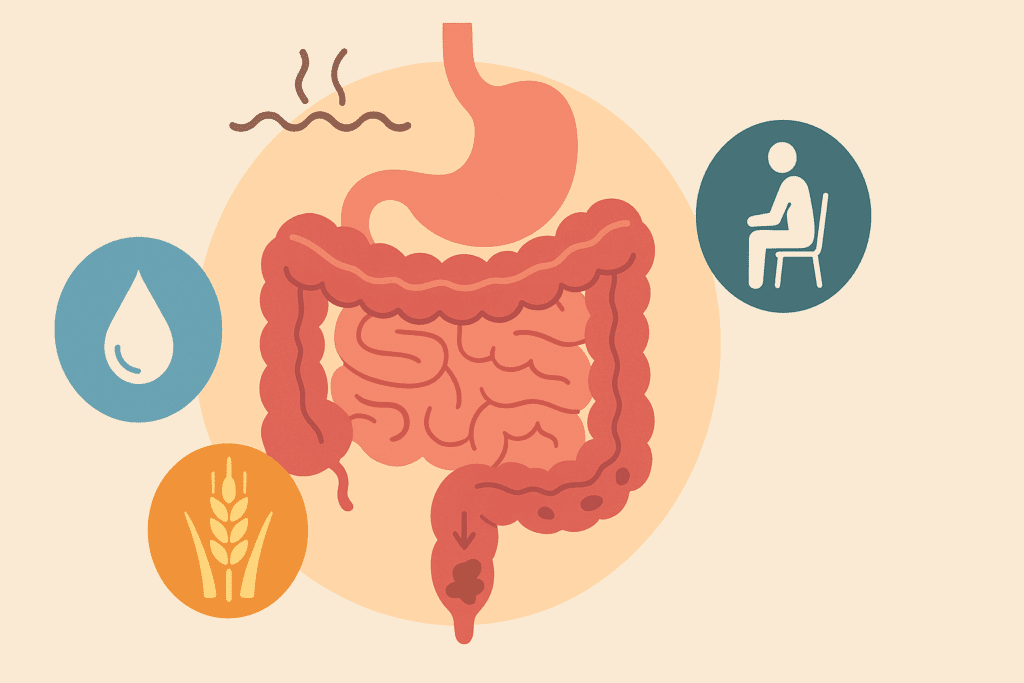
Understanding Constipation: Causes, Symptoms, and Risk Factors
Before diving into banana-based discussions, it’s important to understand what constitutes constipation from a medical perspective. Constipation is typically characterized by infrequent bowel movements, difficulty passing stool, or a feeling of incomplete evacuation. While occasional constipation may be benign, chronic cases can indicate more serious health issues or nutritional imbalances. Common causes include low fiber intake, inadequate hydration, sedentary lifestyle, and certain medications. Additionally, stress and hormonal fluctuations can also disrupt normal bowel function.
Symptoms often include abdominal discomfort, bloating, and straining during defecation. When left unaddressed, constipation may lead to complications such as hemorrhoids, anal fissures, or fecal impaction. Identifying the root cause is essential for effective treatment, and diet frequently plays a pivotal role. Recognizing foods that can cause constipation, as well as those that can ease it, is a vital step in managing and preventing this digestive disorder.
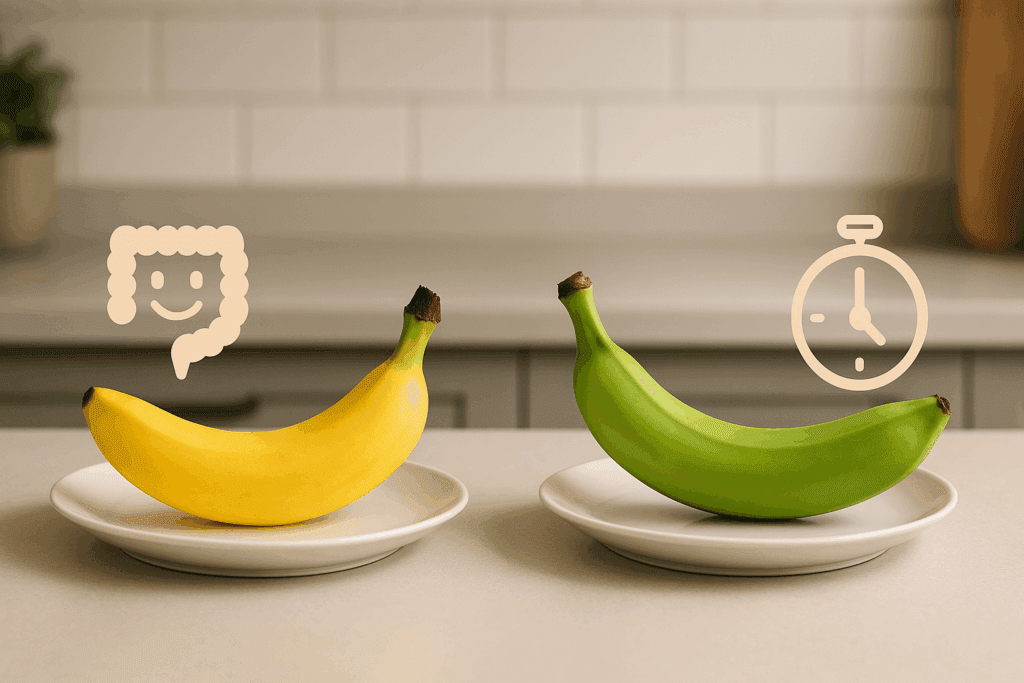
Are Bananas Good for Constipation or a Hidden Culprit?
The question “are bananas good for constipation” often yields conflicting answers, largely due to the fruit’s ripeness and individual digestive responses. Ripe bananas, characterized by yellow skin and brown spots, are rich in soluble fiber known as pectin. This fiber helps absorb water in the intestines, softening stool and promoting smooth passage. Additionally, bananas contain fructooligosaccharides (FOS), prebiotics that feed healthy gut bacteria and enhance digestive efficiency.
On the other hand, unripe or green bananas are higher in resistant starch, a type of carbohydrate that behaves like soluble fiber but can be more challenging to digest. For some individuals, this may lead to slower intestinal transit and increased risk of constipation. However, resistant starch also has benefits, including feeding beneficial gut microbes and improving insulin sensitivity.
Thus, whether bananas help or hurt your digestive health may depend on their ripeness and your individual gut microbiome. For many people, incorporating ripe bananas into a fiber-rich diet can support regularity, while unripe bananas may best be avoided during bouts of constipation.
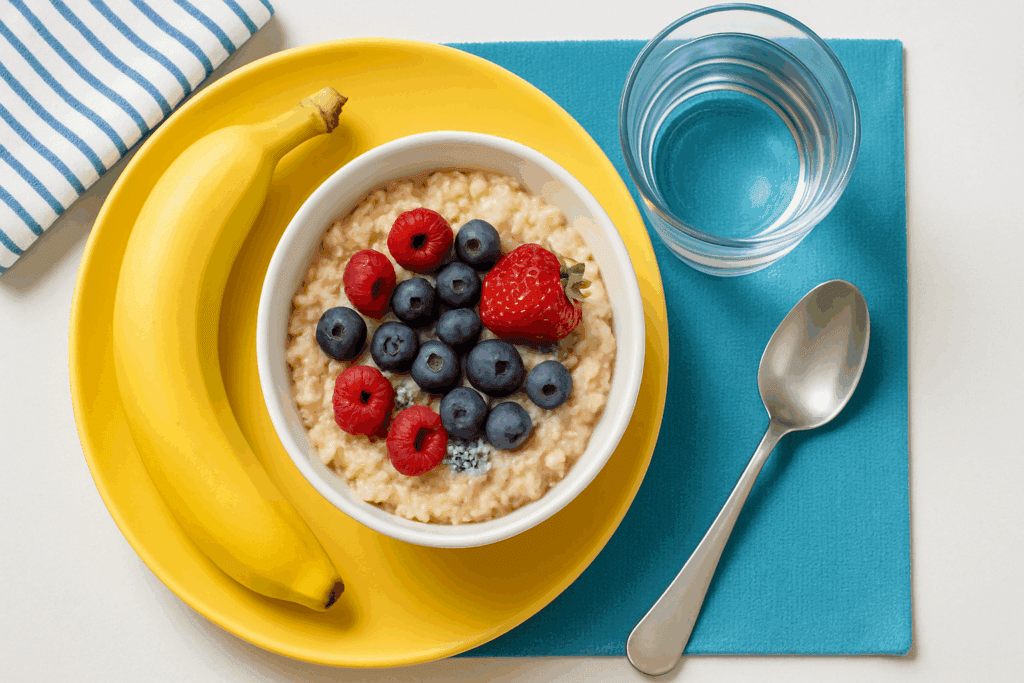
Do Bananas Help with Constipation When Included in a Balanced Diet?
The focus keyword “do bananas help with constipation” deserves a contextual answer grounded in dietary balance. Bananas are not a cure-all, but they can play a meaningful role in a well-rounded gut-friendly eating plan. For example, pairing bananas with other high-fiber foods, such as oatmeal, chia seeds, or prunes, enhances their effectiveness in promoting bowel regularity. This synergistic effect results from the combination of soluble and insoluble fibers, which bulk up stool and facilitate smooth digestion.
Moreover, bananas offer hydration support due to their water content and electrolytes like potassium. Dehydration is a key contributor to constipation, and bananas can aid in maintaining the fluid balance necessary for soft stool formation. Including bananas in smoothies, yogurt bowls, or whole-grain breakfasts can add both flavor and digestive benefits, especially when consumed as part of a consistent, fiber-rich routine.
However, relying solely on bananas without addressing other dietary imbalances or lifestyle factors is unlikely to resolve chronic constipation. While the answer to “do bananas help with constipation” may often be yes, it must be framed within the larger context of holistic gut health practices.

Foods That Can Cause Constipation: What to Watch Out For
Understanding which foods to avoid when constipated is crucial in maintaining digestive harmony. Some foods that cause constipation or make it worse include processed snacks, red meat, and refined grains such as white bread and pasta. These items often lack fiber and may slow digestion due to their low water content and high fat concentration.
Dairy products are another common culprit. Questions like “does cheese make you constipated” or “does milk cause constipation” are frequently raised, especially by individuals with lactose intolerance or sensitivity. Dairy constipation is real for some people, particularly when large quantities of milk, cheese, or yogurt are consumed without accompanying fiber. The terms “milk constipation,” “cheese constipation,” and “dairy constipation” capture the wide-ranging effects of these foods across different bodies.
Eggs also receive mixed reviews. While some ask, “do eggs prevent constipation,” others wonder, “do eggs make you constipated?” or “can eggs cause constipation?” The answer depends largely on what accompanies the eggs. When eaten with fiber-rich vegetables, eggs are unlikely to cause issues. However, a low-fiber, high-protein diet centered around boiled eggs may contribute to constipation. Keywords like “do boiled eggs cause constipation” and “can eggs make you constipated” point to the importance of dietary diversity and balance.

Do Bananas Make You Poop or the Opposite? A Closer Look
Bananas may indeed support bowel movements for many individuals. The fiber in ripe bananas encourages stool bulk and passage, making the answer to “do bananas make you poop” a qualified yes. Their high potassium levels also help maintain muscular contractions in the digestive tract, aiding peristalsis.
That said, banana constipation is a real experience for some, particularly when consuming green bananas or ignoring other contributing factors like hydration and overall fiber intake. To avoid this, individuals should aim for a minimum of 25 to 30 grams of dietary fiber daily and consume at least eight cups of water, both of which complement the positive effects of ripe bananas.
Furthermore, bananas are a source of tryptophan, a precursor to serotonin, which plays a regulatory role in gastrointestinal motility. This neurotransmitter not only affects mood but also gut-brain signaling, potentially explaining why some people feel digestive comfort after eating bananas. Still, this benefit is most pronounced in the context of a balanced and fiber-diverse diet.
Do Bananas Help with Constipation Compared to Other Natural Remedies?
In the realm of holistic supplements and natural remedies, bananas stand out for their accessibility, affordability, and nutritional profile. But how do they compare to other natural constipation remedies? Prunes, for instance, are another well-known solution, rich in sorbitol and insoluble fiber. While bananas contain primarily soluble fiber, prunes work through a different mechanism, drawing water into the intestines and increasing stool frequency.
Chia seeds, flaxseeds, and psyllium husk offer more concentrated fiber sources than bananas and are often used in therapeutic doses to relieve constipation. These foods can be incorporated into smoothies alongside bananas for a powerful digestive blend. Apples, pears, and berries also provide pectin and hydration, reinforcing the benefits seen with bananas.
However, the key advantage of bananas lies in their dual role: they serve as both a gentle binder in cases of diarrhea and a mild laxative when consumed ripe and in moderation. This unique versatility makes them a favored choice in integrative gut health practices. Therefore, while other remedies may offer more potent relief, bananas deliver a more balanced approach that can be sustained over time.
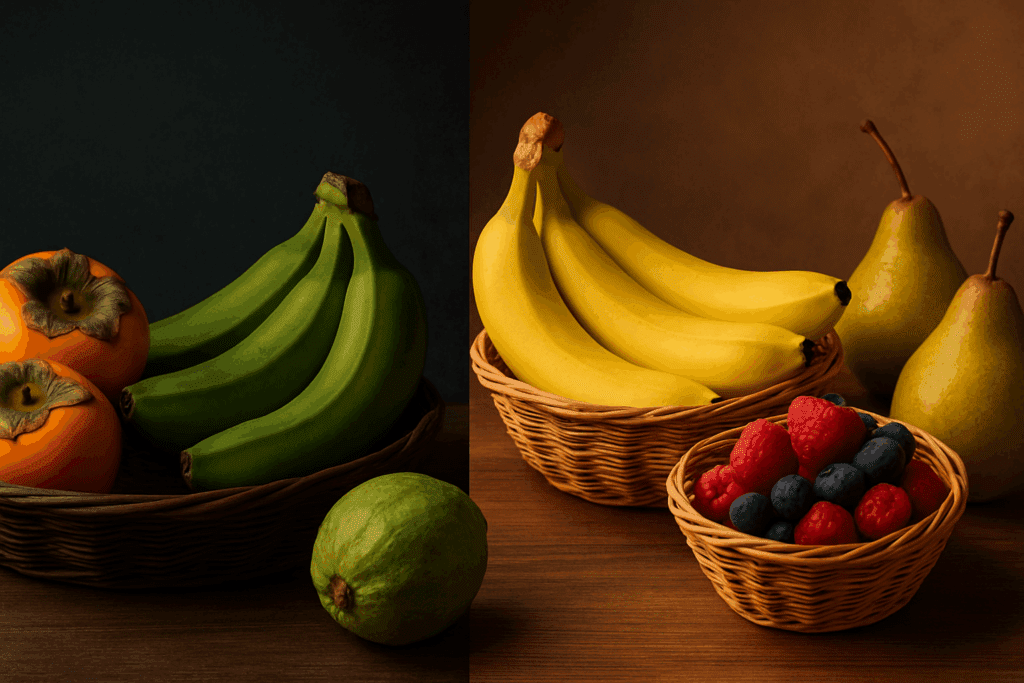
Banana Ripeness and Digestive Impact: Timing Matters
The stage at which a banana is eaten significantly influences its effect on the digestive system. Green bananas, as previously mentioned, contain resistant starch and tannins, which can slow gut motility. For some individuals, this may lead to harder stools and delayed bowel movements. Hence, those prone to constipation are generally advised to avoid green bananas during symptomatic periods.
In contrast, ripe bananas are easier to digest due to the breakdown of complex starches into simpler sugars. The pectin content remains intact, contributing to smoother stool formation and passage. These attributes make ripe bananas especially useful for children and older adults who may have more sensitive digestive systems.
This stage-dependent versatility also means that bananas can be tailored to meet specific gastrointestinal needs. For example, someone recovering from diarrhea may benefit from a green banana for its binding effect, while another person dealing with constipation may opt for a fully ripened banana to stimulate bowel movement. Understanding this distinction helps maximize the therapeutic potential of this everyday fruit.
Common Myths and Misconceptions About Banana Constipation
Misinformation about bananas and their digestive impact abounds in both popular media and casual health discussions. One common myth is that bananas are universally constipating, a belief often based on isolated experiences or the effects of unripe bananas. However, this oversimplification overlooks the role of ripeness, individual gut microbiomes, and overall diet.
Another misconception is that eating multiple bananas daily will guarantee regularity. While bananas do contribute to fiber intake, they alone cannot substitute for a varied diet rich in different fiber sources. In fact, excessive banana consumption without adequate water or fiber from other foods may actually backfire.
Still others believe that bananas should be avoided during any gastrointestinal distress. This view ignores the nuanced way bananas can support both constipation and diarrhea management, depending on their ripeness and preparation. Dispelling these myths requires not only scientific literacy but also personalized observation and experimentation.
Can Dairy Cause Constipation More Than Bananas? A Comparative Insight
When comparing the constipating effects of different food groups, dairy products often rank higher than bananas in contributing to sluggish digestion. Terms like “cheese constipation,” “milk constipation,” and “dairy constipation” are frequently searched because many people experience bloating or difficulty passing stool after consuming these items.
One potential reason is that dairy lacks fiber entirely. This absence makes it difficult for the digestive system to form soft, bulky stools, especially when dairy displaces fiber-rich foods in the diet. Moreover, lactose intolerance—a common condition—can lead to intestinal inflammation that mimics or exacerbates constipation symptoms.
By contrast, bananas contain a spectrum of nutrients and fibers that support rather than hinder digestion. Although individual responses vary, the likelihood of bananas causing significant constipation is generally lower than that of dairy, particularly when bananas are consumed ripe and with sufficient fluids.
Worst Fruits for Constipation and How Bananas Compare
While most fruits are beneficial for digestion, some may contribute to constipation in certain individuals. High-tannin fruits like persimmons, for example, can slow down bowel movements, especially when consumed in excess. Similarly, unripe guava and underripe bananas may be binding due to their astringent properties.
The phrase “worst fruits for constipation” may also apply to fruits that are low in fiber or dehydrating when consumed without adequate water. Some canned or processed fruits with added sugars and preservatives can alter gut motility and microbiome balance, compounding constipation issues.
Compared to these, ripe bananas offer a middle ground. They are neither too binding nor excessively laxative, making them a suitable choice for people seeking gentle digestive support. Their consistent availability and low risk of adverse reactions further cement their reputation as a gut-friendly fruit.
Foods to Avoid When Constipated: Beyond the Obvious
In addition to dairy and processed grains, several less-obvious foods can also contribute to constipation. Fried foods and those high in unhealthy fats slow gastric emptying and reduce gut motility. Caffeinated beverages, though sometimes used as laxatives, can lead to dehydration if consumed in excess, aggravating constipation.
Alcohol, too, disrupts fluid balance and can lead to harder stools. Similarly, too much protein, especially from animal sources, may limit fiber intake and burden the digestive tract. Identifying such hidden contributors is essential for a comprehensive approach to digestive wellness.
By contrast, increasing the intake of fiber-rich fruits like ripe bananas, drinking plenty of water, and staying physically active can create a favorable environment for regular bowel movements. Awareness of what to limit is just as crucial as knowing what to include when addressing constipation through dietary choices.
Frequently Asked Questions (FAQ): Bananas, Constipation, and Gut Health
Do Bananas Help with Constipation When Traveling or Under Stress? Yes, bananas can be particularly useful for managing constipation while traveling or during periods of stress. Travel-related constipation is often triggered by disruptions in routine, dietary changes, and dehydration. Ripe bananas provide a convenient, shelf-stable option rich in fiber and potassium that can help support digestive motility in unfamiliar environments. Moreover, the magnesium and B6 content in bananas can assist with stress regulation, indirectly benefiting bowel function. Although individual responses vary, keeping a ripe banana or two on hand during travel may ease discomfort associated with irregular bowel movements.
How Do Bananas Interact with Other Foods That Can Cause Constipation? Bananas, especially when ripe, can help offset the effects of certain foods that cause constipation. For instance, if your meal includes red meat or refined grains, adding a banana afterward introduces fiber and hydration that might counterbalance those constipating effects. Similarly, when consuming milk products and constipation-inducing dairy items, bananas can introduce a mild laxative effect due to their pectin and water content. However, this benefit is best realized when the banana is paired with adequate water intake and other fibrous elements. Bananas can act as a complementary tool rather than a stand-alone remedy when navigating a diet rich in foods that make you constipated.
Are Bananas Good for Constipation Caused by Medications or Supplements? Many people experience constipation as a side effect of medications such as opioids, iron supplements, or calcium-channel blockers. In such cases, ripe bananas may offer gentle relief by promoting softer stool consistency and smoother passage. However, their impact might be limited when the root cause is pharmaceutical rather than dietary. Including bananas alongside fiber-rich vegetables and whole grains can provide cumulative benefits, especially when medications alter gut motility. Consultation with a healthcare provider remains essential, but bananas can be a useful adjunct in managing medication-induced constipation.
What Role Do Bananas Play in Lactose Intolerance and Dairy Constipation? For individuals who experience dairy constipation due to lactose intolerance, bananas serve as an excellent plant-based alternative that supports bowel regularity without introducing lactose. Unlike milk, cheese, and yogurt—which are all associated with bloating and hard stools in sensitive individuals—bananas supply fermentable fibers and electrolytes that aid in digestion. Replacing one serving of milk with a banana in smoothies or breakfasts may significantly reduce symptoms related to milk constipation. This substitution is especially helpful when trying to identify if dairy products and constipation are connected in your digestive pattern.
Do Bananas Help with Constipation in Children and the Elderly? Yes, bananas are often recommended for both children and the elderly due to their gentle impact on the digestive system. In children, ripe bananas provide easily digestible energy along with fiber that helps prevent banana constipation when consumed in moderation. In the elderly, who may face reduced gut motility and hydration, bananas can serve as a mild laxative when part of a balanced diet. Their soft texture and palatability also make them easier to consume for those with dental or swallowing issues. Monitoring portion sizes and pairing them with hydrating fluids enhances their effect across age groups.
Can Bananas Worsen Constipation When Combined with Low-Fiber Diets? Indeed, if bananas are added to an already low-fiber, high-protein diet—such as one centered around eggs or meat—they may not be sufficient to reverse constipation. Questions like “do eggs make you constipated” and “can eggs cause constipation” often arise because such meals lack the fiber necessary for optimal digestion. While bananas do provide fiber, the amount may not fully compensate for diets dominated by constipating foods. Especially when eating boiled eggs regularly, it’s essential to complement them with high-fiber fruits like ripe bananas, vegetables, and whole grains to maintain regularity. Without this balance, the benefits of bananas may be muted.
Do Bananas Help You Poop More Effectively Than Other Fruits? Compared to other fruits, bananas offer a unique balance of soluble fiber, hydration, and electrolytes that supports gentle bowel movements. However, fruits like prunes, pears, and kiwis may have a stronger laxative effect due to their higher levels of sorbitol and insoluble fiber. Whether bananas make you poop efficiently can depend on ripeness and your gut’s microbial composition. Unlike some of the worst fruits for constipation—such as high-tannin fruits like persimmons—bananas are unlikely to exacerbate symptoms when ripe. Therefore, while bananas help many people maintain regularity, alternating them with other high-fiber fruits ensures better long-term digestive support.
Can Eggs and Dairy Together Offset the Benefits of Bananas? Combining bananas with eggs and dairy-heavy meals may reduce their efficacy in preventing constipation. For example, meals involving cheese omelets, milk-based sauces, or yogurt parfaits may contribute to symptoms described in searches like “cheese constipation,” “can dairy cause constipation,” and “do eggs cause constipation.” While bananas can buffer some of these effects, their benefits may be undermined by insufficient fiber and fluid. To maximize digestive wellness, include vegetables, seeds, or whole grains alongside these meals. Otherwise, even ripe bananas may not fully overcome the combined effects of milk products and constipation-related ingredients.
Do Bananas Cause Constipation When Eaten Too Often? Bananas are generally safe and beneficial, but excessive consumption without dietary diversity may lead to banana constipation in sensitive individuals. This is especially true if green or underripe bananas are consumed in large quantities. Overreliance on bananas without adequate water intake or complementary fibrous foods can contribute to sluggish digestion. While asking “do bananas cause constipation” might yield different answers based on context, moderation remains key. Rotating bananas with other fruits and vegetables ensures the gut receives a range of fibers and nutrients to maintain motility.
Do Bananas Help with Constipation More Effectively When Cooked or Raw? The digestive effects of bananas can shift depending on how they are prepared. Raw ripe bananas retain their natural fiber and water content, which supports bowel regularity. Cooking bananas—as in baking or frying—can break down some fibers and reduce their laxative potential. On the other hand, green bananas used in cooking, such as in certain cultural dishes, may provide resistant starch that feeds gut bacteria over time but could initially slow transit. Thus, to answer the question “do bananas help with constipation” most effectively, choose ripe, raw bananas when seeking immediate digestive relief, and consume cooked bananas mindfully depending on their ripeness and recipe context.
Conclusion: Do Bananas Help with Constipation and Support Gut Health?
Bananas occupy a unique and sometimes misunderstood place in the digestive health conversation. When assessing the question “do bananas help with constipation,” the answer is not a blanket yes or no, but rather a nuanced exploration of ripeness, dietary context, and individual gut biology. Ripe bananas, in particular, offer valuable fibers, hydration, and prebiotic benefits that support bowel regularity and overall gut function.
Compared to other foods that can cause constipation—such as dairy, red meat, or processed snacks—bananas are generally a safer, more beneficial option. They can act as a gentle aid for those experiencing digestive slowdowns, especially when paired with other fiber-rich and hydrating foods. While they may not replace more targeted treatments for chronic constipation, bananas can certainly complement a holistic gut health regimen.
Ultimately, bananas exemplify the importance of context and moderation in dietary choices. By understanding their digestive effects, incorporating them wisely, and remaining attentive to your body’s responses, you can harness their benefits while minimizing potential downsides. In the broader landscape of gut health and holistic supplements, bananas deserve thoughtful consideration as a versatile, accessible, and gut-friendly ally.

